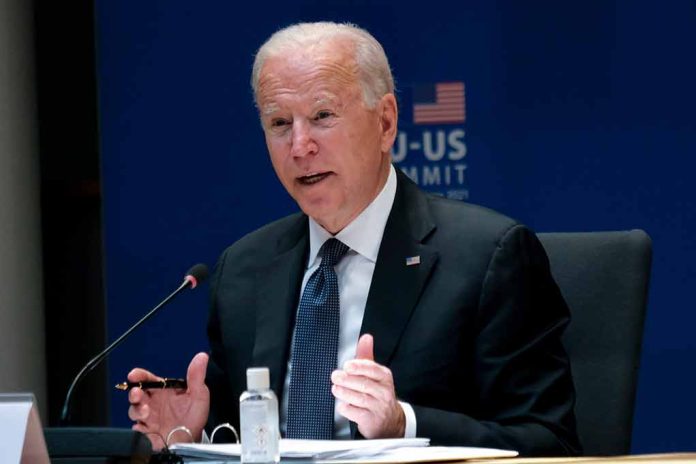
President Biden’s immigration policies have sparked controversy, with claims of a “parallel immigration system” favoring undocumented migrants over legal admissions.
At a Glance
- Biden’s administration reportedly welcomed 2.6 million illegal migrants in 2024.
- The CBO projects federal spending on illegal migrants to cost $278 billion over 10 years.
- Legal and illegal immigration combined allowed 3.6 million migrants in 2024.
- The immigration surge is expected to lower productivity and slightly increase inflation.
Biden’s Immigration Policies: A Controversial Shift
President Joe Biden’s immigration policies have significantly altered the landscape of U.S. immigration, leading to substantial increases in both legal and undocumented migration. The administration’s approach has drawn criticism from conservative circles, with claims of a “parallel immigration system” that allegedly prioritizes undocumented migrants over those following legal pathways.
This shift raises concerns that our country is rewarding illegal behavior while discouraging those who respect our laws.
According to reports, the Biden administration welcomed 2.6 million illegal migrants in 2024 alone. This figure is particularly striking when compared to the legal immigration system, which allows approximately one million legal migrants per year. The disparity has led to concerns about the impact on American workers and the economy.
Many Americans are worried that this approach undermines job opportunities and wages for citizens, especially in a challenging economic environment.
Economic Implications of the Immigration Surge
The Congressional Budget Office (CBO) has projected significant economic consequences stemming from the current immigration surge. A report requested by House Budget Committee Chairman Jodey Arrington estimates that federal spending on illegal migrants will cost $278 billion over the next decade, excluding discretionary and state/local costs.
This massive expenditure raises concerns about fiscal responsibility and whether taxpayers can shoulder such a burden.
“Through 2026, the average wage growth of people in the United States who are not part of the surge is slightly less than it would have been without the surge because the surge slows the growth of wages of people with 12 or fewer years of education,” the CBO states in the report.
The CBO report also highlights potential inflationary pressures, particularly in the housing market. “The greatest upward pressure on prices comes from the increased demand for housing,” the report states. This could exacerbate existing affordability concerns for many Americans.
Challenges for State and Local Governments
While the federal government grapples with the broader economic implications, state and local governments are facing immediate financial strains. The CBO notes, “Increases in immigration raise state and local governments’ costs more than their revenues, and CBO expects that finding to hold in the case of the current immigration surge.” This assessment is exemplified by New York City’s reported expenditure of $4.3 billion from July 2022 to March 2024 on accommodating immigrants.
“The constitution says Congress controls immigration rules, but this is a parallel immigration system outside the law passed by Congress in 1990,” noted Andrew Arthur, a former immigration judge who now works with the Center for Immigration Studies.
The legal implications of Biden’s immigration policies have also come under scrutiny. Federal judges have largely refrained from blocking the administration’s approach, suggesting that any changes to the system should come through legislative action rather than judicial intervention.
Looking Ahead: Immigration and the 2024 Election
As the United States approaches the 2024 presidential election, immigration remains a contentious issue. The Pew Research Center notes, “The growing number of migrant encounters at the southern border has emerged as a key issue in the 2024 election cycle.” With public opinion divided and economic concerns at the forefront, the debate over immigration policy is likely to play a significant role in shaping the political landscape.
Voters are increasingly aware that effective immigration policies are essential for national security and the economic well-being of American families.
As policymakers and voters grapple with these complex issues, the need for a comprehensive and balanced approach to immigration reform becomes increasingly apparent. The challenge lies in reconciling economic needs, humanitarian concerns, and the rule of law in a way that serves the best interests of American citizens.








